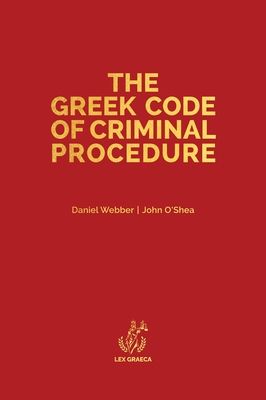Home
Criminal Procedure: Adjudication
Loading Inventory...
Barnes and Noble
Criminal Procedure: Adjudication
Current price: $278.00


Barnes and Noble
Criminal Procedure: Adjudication
Current price: $278.00
Loading Inventory...
Size: OS
*Product Information may vary - to confirm product availability, pricing, and additional information please contact Barnes and Noble
Buy a
new version
of this textbook and receive access to the Connected eBook with Study Center on Casebook Connect, including lifetime access to the
online ebook
with highlight, annotation, and search capabilities. Access also includes
practice questions
, an
outline tool
, and other
helpful resources
. Connected eBooks provide what you need most to be successful in your law school classes.
Written in a student-friendly manner, the fourth edition of
Criminal Procedure: Adjudication
eschews excessive reliance on rhetorical questions and law review excerpts in favor of comprehensive exploration of black letter law and current policy issues. Authored by a pair of well-respected criminal and constitutional law scholars,
utilizes a chronological approach that guides students through criminal procedure doctrine, from prosecution initiation to habeas corpus relief. In addition to presenting the perspectives from various stakeholders (
e.g.
defense attorneys, judges, prosecutors, and victims), the authors take care to provide students with useful, practice-oriented materials, including pleadings and motions papers.
not only employs a systemic approach that takes students through each step of criminal adjudication, but also introduces issues at the forefront of modern criminal procedure debates.
New to the Fourth Edition:
The Fourth Edition has been thoroughly updated to provide analysis of important, recent decisions in the area of Criminal Procedure, including several decisions from the Supreme Court’s most recent terms and discussion of policy issues at the forefront of criminal law.
New cases include McCoy v. Louisiana (Sixth Amendment right to counsel); Ramos v. Louisiana (trial by jury); Flowers v. Mississippi (jury composition and selection); Jones v. Mississippi (sentencing); Bucklew v. Precythe (the death penalty); and Gamble v. United States (the dual sovereignty doctrine in double jeopardy)
Professors and student will benefit from:
Straightforward writing style and dynamic text
Clear and not cluttered with law reviews excerpts
Relies on cases and author essays rather than excerpts and rhetoric questions
Presents thoughtfully edited principal and note cases
Intuitive organization and chronological presentation
Presents topics in easy-to-understand approach from prosecution to post-conviction relief
Approachable organization based on common progression through criminal justice system
Systematic and cohesive presentation of topics
Explores underlying policy before heading into doctrinal specifics
Practice-oriented features
Discussion of important, modern criminal procedure issues
Useful examples for future and current criminal law practitioners
Teaching materials Include:
Teacher’s Manual
PowerPoints
Practice exams
Supplemental handouts and practice materials
Companion video
new version
of this textbook and receive access to the Connected eBook with Study Center on Casebook Connect, including lifetime access to the
online ebook
with highlight, annotation, and search capabilities. Access also includes
practice questions
, an
outline tool
, and other
helpful resources
. Connected eBooks provide what you need most to be successful in your law school classes.
Written in a student-friendly manner, the fourth edition of
Criminal Procedure: Adjudication
eschews excessive reliance on rhetorical questions and law review excerpts in favor of comprehensive exploration of black letter law and current policy issues. Authored by a pair of well-respected criminal and constitutional law scholars,
utilizes a chronological approach that guides students through criminal procedure doctrine, from prosecution initiation to habeas corpus relief. In addition to presenting the perspectives from various stakeholders (
e.g.
defense attorneys, judges, prosecutors, and victims), the authors take care to provide students with useful, practice-oriented materials, including pleadings and motions papers.
not only employs a systemic approach that takes students through each step of criminal adjudication, but also introduces issues at the forefront of modern criminal procedure debates.
New to the Fourth Edition:
The Fourth Edition has been thoroughly updated to provide analysis of important, recent decisions in the area of Criminal Procedure, including several decisions from the Supreme Court’s most recent terms and discussion of policy issues at the forefront of criminal law.
New cases include McCoy v. Louisiana (Sixth Amendment right to counsel); Ramos v. Louisiana (trial by jury); Flowers v. Mississippi (jury composition and selection); Jones v. Mississippi (sentencing); Bucklew v. Precythe (the death penalty); and Gamble v. United States (the dual sovereignty doctrine in double jeopardy)
Professors and student will benefit from:
Straightforward writing style and dynamic text
Clear and not cluttered with law reviews excerpts
Relies on cases and author essays rather than excerpts and rhetoric questions
Presents thoughtfully edited principal and note cases
Intuitive organization and chronological presentation
Presents topics in easy-to-understand approach from prosecution to post-conviction relief
Approachable organization based on common progression through criminal justice system
Systematic and cohesive presentation of topics
Explores underlying policy before heading into doctrinal specifics
Practice-oriented features
Discussion of important, modern criminal procedure issues
Useful examples for future and current criminal law practitioners
Teaching materials Include:
Teacher’s Manual
PowerPoints
Practice exams
Supplemental handouts and practice materials
Companion video


















